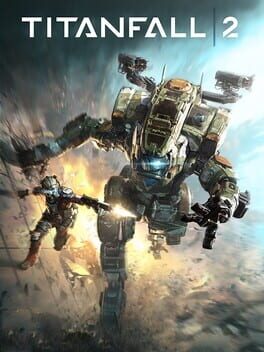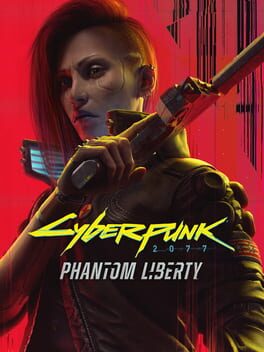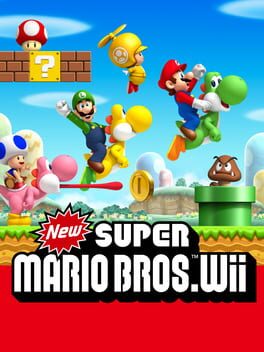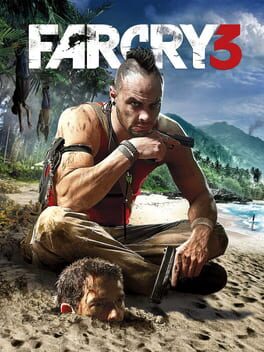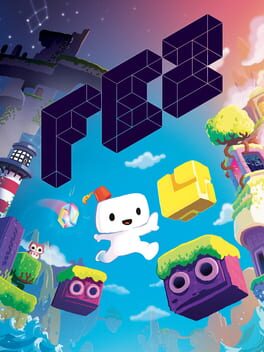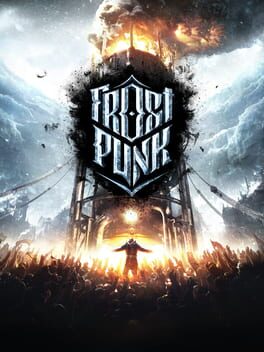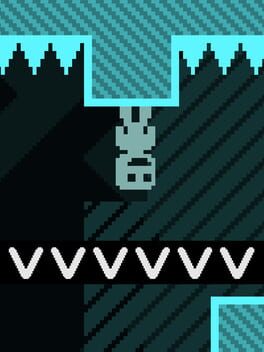liamholland
Bio
no star ratings; you have to read the review to know what I think
no star ratings; you have to read the review to know what I think
Badges

Liked
Gained 10+ total review likes

On Schedule
Journaled games once a day for a week straight

Shreked
Found the secret ogre page

Roadtrip
Voted for at least 3 features on the roadmap

N00b
Played 100+ games
Favorite Games
237
Total Games Played
023
Played in 2024
202
Games Backloggd
Recently Played See More
Recently Reviewed See More
Fez has got to be one of the most clever games I have played. It is hard to pin down exactly what sort of game this wants to be. It has platforming, yes; but it shows no signs of of wanting to challenge the player with checkpoints, lives or long levels. "Death" in this game serves more to convenience the player than to punish them. "Oh you missed a jump? Go on, try again, you'll get it this time!" it seems to say as it places you right back where you fell from. It has puzzles, but the only mechanical consistency between them is that there are no two which can be solved the same way. "So you decoded the Tetris Block code? Good job! We're not going to be using that from now on though..."
This might come off like I am sarcastically mocking the game, but these are actually the reasons why Fez is so phenomenal. The game has no interest in something as primitive as mechanics, story or level design. It wants to give you a perspective, make you consider problems, information and images in different ways and it achieves this everywhere it tries. No puzzles can be solved in the same way because you must adopt a new line of thinking for each one. The game does not give you a narrative motivation because if you booted it up, you should want to play for the sake of playing. The platforming is forgiving because the game does not care about how well you can press buttons, but how well you can shift your perspective to traverse an area.
Of course, that does not meant the game is always easy to play. There are some problems, such as the awkwardness of moving around the world, the warp gates not really feeling like they help you all that much, the minor visual and mechanical clunkiness you experience and how, although a compelling choice which speaks to the mentality of the creator, the puzzles can be so obscure and abstract that they can become frustrating. However, ultimately, I think I can overlook these grievances given how impressively the game achieves its main objective.
The visuals are fantastic. The 2D pixel graphics are cute and inviting, but seeing the level move from 2D to 3D and back again never gets old. The fact that this mechanic has not been more widely utilised, as the pixel-art style has, speaks to the idea that what Fez has achieved here is not so easily replicated. It is not only visually pleasing, but a technical marvel.
The game concludes with no less of a spectacle. I have not 100% completed this game, but the ending I received was no disappointment. The graphics, colours and vectors it presents boils the interactive medium down to its basic building blocks in order to remind you what actually makes it up. I really think it is a pretty stunning thing to behold, and works so well because of how successfully the game has communicated its "raison d'être" up to this point.
The fact that Fez has no secret achievements is a great way to highlight the game's philosophy. This is exactly the type of game that you would expect that from, but this game has no intentions of hiding anything from you. Its puzzles are not about obfuscation, they are about enlightenment. Every facet of the design of this game is meant to have you think outside the box (some call it a cube). Scanning a QR code was not as prevalent a means to receive information as it is now, over a decade later, but finding some items rely simply on scanning one, it is up to you to know how to do that.
Even if times have changed, Fez holds up, and I would now consider this game a must play. Not only is it a delight in its presentation, but it is a masterpiece in its conception and art in its execution. I strongly recommend this to anyone who wants to see something different.
This might come off like I am sarcastically mocking the game, but these are actually the reasons why Fez is so phenomenal. The game has no interest in something as primitive as mechanics, story or level design. It wants to give you a perspective, make you consider problems, information and images in different ways and it achieves this everywhere it tries. No puzzles can be solved in the same way because you must adopt a new line of thinking for each one. The game does not give you a narrative motivation because if you booted it up, you should want to play for the sake of playing. The platforming is forgiving because the game does not care about how well you can press buttons, but how well you can shift your perspective to traverse an area.
Of course, that does not meant the game is always easy to play. There are some problems, such as the awkwardness of moving around the world, the warp gates not really feeling like they help you all that much, the minor visual and mechanical clunkiness you experience and how, although a compelling choice which speaks to the mentality of the creator, the puzzles can be so obscure and abstract that they can become frustrating. However, ultimately, I think I can overlook these grievances given how impressively the game achieves its main objective.
The visuals are fantastic. The 2D pixel graphics are cute and inviting, but seeing the level move from 2D to 3D and back again never gets old. The fact that this mechanic has not been more widely utilised, as the pixel-art style has, speaks to the idea that what Fez has achieved here is not so easily replicated. It is not only visually pleasing, but a technical marvel.
The game concludes with no less of a spectacle. I have not 100% completed this game, but the ending I received was no disappointment. The graphics, colours and vectors it presents boils the interactive medium down to its basic building blocks in order to remind you what actually makes it up. I really think it is a pretty stunning thing to behold, and works so well because of how successfully the game has communicated its "raison d'être" up to this point.
The fact that Fez has no secret achievements is a great way to highlight the game's philosophy. This is exactly the type of game that you would expect that from, but this game has no intentions of hiding anything from you. Its puzzles are not about obfuscation, they are about enlightenment. Every facet of the design of this game is meant to have you think outside the box (some call it a cube). Scanning a QR code was not as prevalent a means to receive information as it is now, over a decade later, but finding some items rely simply on scanning one, it is up to you to know how to do that.
Even if times have changed, Fez holds up, and I would now consider this game a must play. Not only is it a delight in its presentation, but it is a masterpiece in its conception and art in its execution. I strongly recommend this to anyone who wants to see something different.
As far as city builders go, I believe I have only really ever played Cities: Skylines and this game. I do really enjoy them, but I often feel like it is very easy to end up in a doom spiral. Frostpunk, at least for me, is also a lot more difficult than Cities: Skylines, mainly because the number of different resources makes it a lot easier to fall into said doom spiral. I have not played enough of this game to say why this happens, or enough of the other offerings into this genre to truly assess its quality, but one day I do want to come back to this and at least beat every scenario.
As it stands, I have only beaten the first, "A New Home" and come close to beating "Refugees". I really like the way the scenarios offer slight variations which mean you have to adopt an entirely new strategy. In what I have played, I have found that once you find that winning strategy, it almost swings the other way to you having too many resources and making the game far easier, but again, I cannot say if that will always be the case.
I got addicted to this game for a few days, but I think I really oversaturated myself with it, while also expecting the initial scenario to take a bit longer and not have such a final and sudden conclusion right after the storm. I can see there is a lot more to experience here, and from what I have played, I would certainly recommend the game.
As it stands, I have only beaten the first, "A New Home" and come close to beating "Refugees". I really like the way the scenarios offer slight variations which mean you have to adopt an entirely new strategy. In what I have played, I have found that once you find that winning strategy, it almost swings the other way to you having too many resources and making the game far easier, but again, I cannot say if that will always be the case.
I got addicted to this game for a few days, but I think I really oversaturated myself with it, while also expecting the initial scenario to take a bit longer and not have such a final and sudden conclusion right after the storm. I can see there is a lot more to experience here, and from what I have played, I would certainly recommend the game.
I played this game on St. Patrick's Day since the creator, Terry Cavanagh, is a fellow Irishman. I thought if I was going to play a game on the day, it should be an Irish one. I was delighted then, when VVVVVV turned out to be a really great time. I cannot claim that it represents or celebrates Irish culture in any particular way, apart from maybe our long history of high quality exports to other countries; Cavanagh is based in London now, and that is where he developed this game.
Despite the short runtime, the game's fast pace allows it to explore its core mechanic completely. The concept of VVVVVV is that instead of a standard jump, your "jump" button causes gravity to flip, causing the player to fall towards the ceiling or the floor on an alternating basis. Combined with a variety of different environmental modifiers, Cavanagh manages to deliver a truly challenging and creative platformer, without it ever becoming too frustrating or tiring. The game is all about execution, with each room having a fairly obvious route, but requiring specific and precise execution of the controls to make it to the other side. Having the game broken into these rooms, much like in Celeste, which was released some years later, allows for the pace to be maintained and for an endlessly satisfying experience for the player.
The game will not be too difficult for anyone to beat, but the inclusion of 20 optional collectibles provides extra challenge for players who want more. These challenges come in many different forms, such as especially difficult platforming sections or taking advantage of the game's systems to reach previously inaccessible areas. Each feels cleverly designed, and I felt as though the game was goading me into figuring out how to reach each one.
With that said, I only ended up getting seventeen out of twenty. This was because of a particular section towards the end of the game, where I could not stop to try and reach the collectibles I needed again and again. I would have started the whole section again, but it just so happened that the crew member located in this area was the last I needed to rescue, and once I had achieved this I was forced into completing the final section of the game. It is kind of a pity, and I would have appreciated a warning and a chance to explore the map to its fullest before I wrapped up the playthrough.
On that point, I believe that the fill-in map should not have been included in this game. It was undeniably useful, and contributed to the short runtime, but the way the rest of the game evokes retro platformers does not really fit with the map for me. Cavanagh himself said this game was a chance for him to indulge his "retro fetish", which makes me think that this addition was more concession than consideration. The general world is not that hard to explore, so removing the map and simply allowing players to wander around, accepting that they will inevitably get lost would, I believe, provide for a better sense of being lost on an alien world. It would heighten the sense of accomplishment when you finally track down each crew member, and make it more difficult to uncover secrets.
This is a small gripe, really. The main focus of the game is the platforming sections, and this setup allowed Cavanagh to have players remain focused on that while giving them the sense of one game, not one divided into a number of individual levels, selected from a menu. It is a valid compromise, and one I think I can live with.
Finally, I want to mention the art direction in this game. They are truly striking, which is not something I expected. Here Cavanagh really did indulge his "retro fetish", but not without adding some more modern elements such as animated backgrounds which, although subtle, add to the impact of the visuals. Almost every time the room changes the walls are a different colour, not only allowing the player to orient themselves, but almost jolting them awake, screaming at them to pay attention. I loved it and although I would love to see it again, it would be hard to execute outside of a creation specifically designed with it in mind, such as this one.
Overall, I would really recommend VVVVVV to anyone who wants to have a short, but extremely unique platforming experience. The game offers great gameplay and striking visuals which combine to create a comprehensive work that is definitely worth the perseverance required to complete it.
Despite the short runtime, the game's fast pace allows it to explore its core mechanic completely. The concept of VVVVVV is that instead of a standard jump, your "jump" button causes gravity to flip, causing the player to fall towards the ceiling or the floor on an alternating basis. Combined with a variety of different environmental modifiers, Cavanagh manages to deliver a truly challenging and creative platformer, without it ever becoming too frustrating or tiring. The game is all about execution, with each room having a fairly obvious route, but requiring specific and precise execution of the controls to make it to the other side. Having the game broken into these rooms, much like in Celeste, which was released some years later, allows for the pace to be maintained and for an endlessly satisfying experience for the player.
The game will not be too difficult for anyone to beat, but the inclusion of 20 optional collectibles provides extra challenge for players who want more. These challenges come in many different forms, such as especially difficult platforming sections or taking advantage of the game's systems to reach previously inaccessible areas. Each feels cleverly designed, and I felt as though the game was goading me into figuring out how to reach each one.
With that said, I only ended up getting seventeen out of twenty. This was because of a particular section towards the end of the game, where I could not stop to try and reach the collectibles I needed again and again. I would have started the whole section again, but it just so happened that the crew member located in this area was the last I needed to rescue, and once I had achieved this I was forced into completing the final section of the game. It is kind of a pity, and I would have appreciated a warning and a chance to explore the map to its fullest before I wrapped up the playthrough.
On that point, I believe that the fill-in map should not have been included in this game. It was undeniably useful, and contributed to the short runtime, but the way the rest of the game evokes retro platformers does not really fit with the map for me. Cavanagh himself said this game was a chance for him to indulge his "retro fetish", which makes me think that this addition was more concession than consideration. The general world is not that hard to explore, so removing the map and simply allowing players to wander around, accepting that they will inevitably get lost would, I believe, provide for a better sense of being lost on an alien world. It would heighten the sense of accomplishment when you finally track down each crew member, and make it more difficult to uncover secrets.
This is a small gripe, really. The main focus of the game is the platforming sections, and this setup allowed Cavanagh to have players remain focused on that while giving them the sense of one game, not one divided into a number of individual levels, selected from a menu. It is a valid compromise, and one I think I can live with.
Finally, I want to mention the art direction in this game. They are truly striking, which is not something I expected. Here Cavanagh really did indulge his "retro fetish", but not without adding some more modern elements such as animated backgrounds which, although subtle, add to the impact of the visuals. Almost every time the room changes the walls are a different colour, not only allowing the player to orient themselves, but almost jolting them awake, screaming at them to pay attention. I loved it and although I would love to see it again, it would be hard to execute outside of a creation specifically designed with it in mind, such as this one.
Overall, I would really recommend VVVVVV to anyone who wants to have a short, but extremely unique platforming experience. The game offers great gameplay and striking visuals which combine to create a comprehensive work that is definitely worth the perseverance required to complete it.

